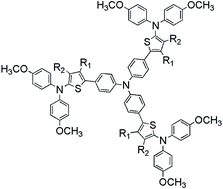Di(p-methoxyphenyl)amine end-capped tri(p-thiophenylphenyl)amine based molecular glasses as hole transporting materials for solid-state dye-sensitized solar cells†
Abstract
Three tris(thienylphenyl)amine-based molecular glass hole transporting materials were synthetized, characterized and incorporated in solid state dye-sensitized solar cells. Devices using these compounds as solid hole conductors show relatively high Voc thanks to good energy level matching between them and the associated D102 indoline dye. However, they yield relatively low Jsc and FF compared to Spiro-OMeTAD based control devices, which is due to an order of magnitude lower conductivity with respect to Spiro-OMeTAD. Maximum solar-to-electrical energy conversion efficiencies of 1.2% under standard illumination condition was obtained. Stability tests of unsealed devices in air under continuous illumination have been performed and devices based on new compounds have kept up to 80% of their initial efficiency.


 Please wait while we load your content...
Please wait while we load your content...